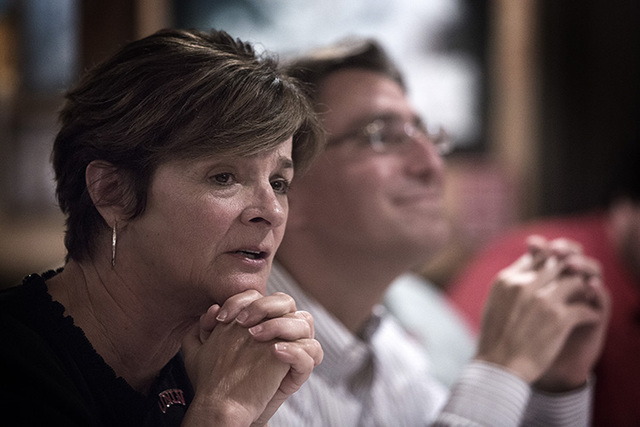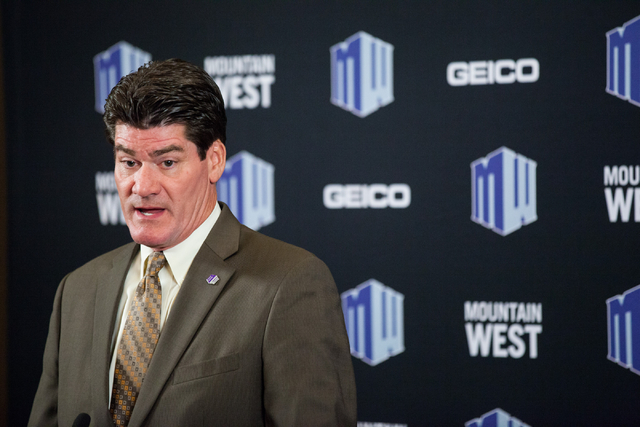UNLV not getting its slice of TV pie
I would think fairness should matter to all athletic conferences across the country when it comes to membership and ensuring everyone within the framework has an equal opportunity at success.
Some athletic departments are just bigger and better than others. That’s reality. That’s life.
But while a league can’t control advantages some have in coaching and recruiting and tradition and fundraising and booster participation, it absolutely can go out of its way to make certain any financial incentives offered by the conference to member schools are distributed as justly as possible.
In this sense, the Mountain West and its TV contract for football has failed miserably for many schools, particularly UNLV.
Consider: In the first two years of the league’s deal with CBS and ESPN, Boise State football will have made a conference-high $3.7 million from the Mountain West’s bonus system, which pays schools a specific amount for appearing on certain channels.
Nine other schools (Hawaii isn’t eligible) will have made anywhere from $2.4 million to $300,000.
UNLV will have made zero.
Nothing.
Not one red cent.
Had the bonus money been evenly distributed for two years, UNLV would have received $1.2 million.
“It’s horrible,” Rebels athletic director Tina Kunzer-Murphy said. “Everyone wants a piece of the pie. We’re no different. I’m concerned. Others are getting millions of dollars in this bonus system and we get nothing? It’s obviously a red flag. Right now, it’s not working for UNLV. We have to get it changed, because it’s not acceptable.”
It isn’t that easy.
It might be impossible for now.
The background: The league’s TV contract runs through 2019-20. The conference pays its teams a bonus of $300,000 for appearing on ESPN, ESPN2, ABC, CBS, NBC or Fox as part of a Mountain West-controlled telecast on a weekday. Teams receive $500,000 for such games on a Saturday.
It’s pretty much about the top two ESPN channels, however, given CBS and ABC and Fox aren’t clamoring to show average to bad football. They always have the Big Ten for that.
In falling over itself in 2012 to keep Boise State from jumping to the Big East Conference, the Mountain West leveraged far too much for a program that would have likely never been foolish enough to leave for what was a crumbling league.
The Mountain West played its hand too soon.
In short, the Broncos are guaranteed a minimum of $900,000 in bonuses annually, a predetermined windfall each year no matter how good or bad Boise State proves in a previous season.
Don’t blame Boise State. It made a great deal for itself.
Blame those Mountain West presidents and athletic directors who negotiated it.
I don’t know what the conference thinks of its top-tiered channel (CBS Sports Network) when it only pays bonuses for appearances on the ESPN side of the ledger, but it can’t be much.
A good TV contract for football should produce three factors — significant revenue, exposure and control of programming. I would argue the Mountain West falls short on all three, given its annual payout to teams (in the $1.2 million range before bonuses) is 17 times less than that of the Atlantic Coast Conference.
Should the ACC really rank 17 times better than the Mountain West in these matters?
It’s also true CBS Sports Network gets the initial picks for Mountain West football games each year over more desirable exposure on ESPN, and that networks control days and times of games (hello, late-night kickoffs in Idaho and 20 degree weather).
Now, maybe that’s the best a nonpower conference in 2014 can do in terms of a TV contract. Maybe this is the ceiling for the Mountain West. I won’t fault ESPN for choosing not to place UNLV football on one of its two major channels, given the Rebels are 15-48 over the past five years. They’re really bad.
But if the conference doesn’t have the power/juice/influence to convince ESPN that it should spread out those bonus games more evenly, why not offer similar bonuses (for less money given it’s not football) in men’s basketball? That way, it could get a school such as UNLV and others some money back to offset the little or nothing they have received in football for two years.
Presidents decide these things. Athletic directors. The league office is in place to coordinate and implement those decisions made by the membership, although I would hope there are at least some in Colorado Springs, Colo., who might better sway others in the realm of fairness.
I’m not sure anymore.
I’m not sure how hard they try.
Boise State returns to UNLV’s football schedule next season, so perhaps the Rebels are in line to be included as a bonus game. But what about those schools now dropping off the Broncos’ schedule?
The league does pay schools a $50,000 inconvenience fee for games played after 7 p.m. local time for nonbonus networks, of which UNLV has received $100,000. Boise State got the same. Some got more, some less.
Every conference will have its one or two best teams, the faces of a particular league, those programs that have been successful enough over time to be worthy of earning great exposure.
But there is something wrong with the fact that there is an eighth-grader somewhere in this country who will attend Boise State on a football scholarship and already the Broncos are guaranteed nearly $1 million in TV bonuses from their conference during his freshman season, even if they go 0-12 the previous year.
There is something very wrong that a nonpower conference in today’s world of college football and shrinking budgets for the have-nots has predetermined such a thing for just one of its members while the others hope and pray they too find similar gifts under the tree each December.
That is not a system based on the principle of fairness.
Kunzer-Murphy probably will sit at a table this afternoon and with family and friends give thanks over a spread of turkey and trimmings. I know one thing she won’t be appreciative of, and shouldn’t be.
Two years later, you really can’t explain away this: $3.7 million to zero.
Las Vegas Review-Journal sports columnist Ed Graney can be reached at egraney@reviewjournal.com or 702-383-4618. He can be heard from 11 a.m. to 2 p.m. Monday through Friday on “Gridlock,” ESPN 1100 and 100.9 FM. Follow him on Twitter: @edgraney.


















